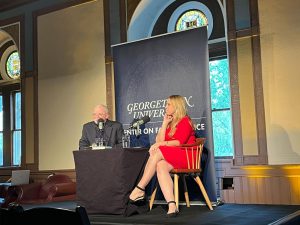Journalist Sarah McCammon reflected on her personal religious experience and claimed that a lack of inclusivity and equity is compelling young people to leave the white evangelical Christian church at an April 17 book talk.
McCammon, a national political correspondent for National Public Radio (NPR), presented her new book “The Exvangelicals: Loving, Living, and Leaving the White Evangelical Church,” which synthesizes anecdotal stories and investigative journalism. Speaking about her personal relationship to the Christian church, McCammon detailed how her knowledge of religious language and her familial connections have influenced her work as a political reporter.
McCammon said she attributed what she found to be a disproportionate amount of white women leaving the church to an institutional perspective on the female role in family and leadership.
“I don’t think it should be a huge surprise. Women in many evangelical spaces have been kind of systematically marginalized, not allowed to be in leadership roles and told that, to some extent, their role in life is fairly limited,” McCammon said.

“Growing up I got a lot of messages about how being a wife and mother was the highest and most important calling, and those are beautiful callings and that’s part of my life, but I always wanted other things too,” she added.
The term evangelical comes from the Greek word for gospel and, though it is used differently by different people, the word largely refers to a person or organization highly committed to the Christian message that Jesus is humanity’s savior.
McCammon also said that purity culture, which emphasizes modesty and abstinence, can be an isolating experience that drives women and girls away from evangelical spaces.
“Purity culture and modesty and all of these expectations are put on young adults and girls about covering up, about not tempting men. I think this is true in a lot of conservative cultures, not just evangelicalism, but it’s something that a lot of the women I’ve encountered in these spaces have really struggled with, so I don’t think it’s a big surprise,” McCammon said.
McCammon added that the church has largely failed to meet a desire for inclusive spaces, further contributing to the number of people leaving the church.
“The things they most want to see are authenticity and inclusion, and I think inclusion is one of the big reasons people cite for leaving churches, is the way that churches talk about LGBTQ people,” McCammon said. “That is a major generational shift that we’ve seen in our country, much more acceptance and inclusion of LGBTQ people, and so it’s no surprise that people would want that from their church.”
McCammon discussed how she chose the term “exvangelical,” a combination of “evangelical” with the word “ex,” saying that the term’s rise in popularity has helped people with similar experiences as her come to terms with their relationship to religion.
“There’s a really robust internet culture around words like deconstruction, and even the term exvangelical is one that was sort of born as a hashtag on the internet,” McCammon said at the event. “There are a lot of people of my generation, and a little older and a little younger, who are sort of processing their faith in this way and have a lot to talk about.”
Within circles of Christian religious discourse, the term deconstruction refers to the process of examining one’s relationship with their faith, which may lead to leaving the church altogether.
In her book, McCammon wrote about her personal experience with her grandfather, who was gay and had a long-term partner, saying her relationship with him was a particularly impactful element of her transition out of the church.
“Throughout my childhood he was sort of a symbol of the lost, the unsaved that we as evangelicals are taught to meet, to evangelize, to share your faith with,” she said. “Most nights at dinner, as a rote prayer, we would pray for Grandpa to be saved.”
McCammon said her religious background has allowed her to better understand rhetoric used among many conservative candidates in recent elections.
“I feel like part of the reason I wrote the book is I didn’t really ask to play this role, but the last several years I’ve found myself accidentally in these spaces where everything I knew and heard growing up is right there again, at the center of our politics,” McCammon said. “It feels like, for those of us who know what that means, it becomes our job to just translate and explain it.”








